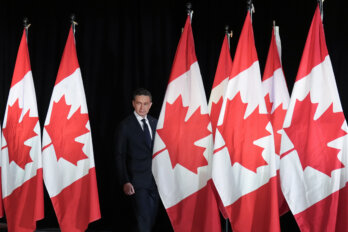RussiaTodayNorth Korea successfully launches its long-range Unha-3 rocket.
INTERNATIONAL
On Wednesday, North Korea successfully launched a rocket into space, and deployed an earth surveillance satellite into orbit. The Unha-3 launch proved at once that North Korea has: (1) scant regard for international policing, and (2) viable long-range missile technology (feared capable of reaching the United States).
Analysts deduced that Syrian president Bashar al-Assad’s iron-fisted regime may be on its last legs, and that their strongest ally, Russia, was “waking up to the reality” yesterday, after overhearing the Russian Deputy Foreign Minister address a Kremlin chamber. “There is a trend for the [Syrian] government to progressively lose control over an increasing part of the territory,” Mikhail Bogdanov told the assembly. Today, Russia denied that its stance was changing, and said that Bogdanov’s statements were taken out of context.
The US, joined by many European and Arab nations, has recognized the legitimacy of the opposition Syrian National Coalition. Canada, however, has not. This week, Foreign Affairs Minister John Baird travelled to Morocco to explain the Harper government’s preconditions for official recognition. Meanwhile, Ottawa has pledged another $15 million in humanitarian aid for refugees escaping Syria, bringing its total obligation to $22 million.
In Egypt, President Mohamed Morsi is forging ahead with a constitutional referendum. The opposition has pulled out all stops to defeat passage of the Islamist-backed draft constitution. The National Salvation Front has organized rallies, and bought TV ads, while unionized workers have declared an independent city, all to urge Egyptians to say “no” to the document. Voters will cast their ballots tomorrow.
Nelson Mandela, former president of South Africa and leader of that country’s anti-apartheid movement, is in hospital and responding to treatment for a recurring lung infection. “Madiba,” as he is reverentially called, is a Companion of the Order of Canada and an honorary Canadian citizen.
FEDERAL
In Ottawa, the Supreme Court of Canada upheld the country’s anti-terrorism law after two men challenged its motive clause, which states that terrorist activity is committed “in whole or in part for a political, religious or ideological purpose, objective or cause.” The men said the law inhibits freedom of expression, freedom of religion, and freedom of association, and that it “would legitimize law enforcement action aimed at scrutinizing individuals based on their religious, political or ideological beliefs.” Chief Justice Beverly McLachlin rejected their appeal, writing, “While the activities targeted by the terrorism section of the Criminal Code are in a sense expressive activities, most of the conduct caught by the provisions concerns acts or threats of violence.”
Federal Court Judge Richard Mosley presided over a hearing in the robocall scandal that could see the results of the last federal election invalidated in a half-dozen ridings. Lawyers representing eight voters and six defeated NDP candidates argued that a series of misleading and harassing phone calls deterred voters from casting ballots in May 2011. James Duggan, acting on behalf of the NDP, urged Mosley to hold MPs from the Conservative Party—which won all six ridings—liable for the alleged suppression campaign. The court is extending hearings till Monday.
The Conservative government successfully sold Alberta-based Nexen Inc. to China National Offshore Oil Corporation (CNOOC) for $15.1 billion dollars—a controversial agreement that piqued the opposition. Earlier this year, NDP leader Thomas Mulcair said the deal would turn Canada into a resource colony.
Speaking of Mulcair, the opposition leader got into a fiery exchange with Stephen Harper during this Wednesday’s Question Period in Parliament. Afterward, @pmharper tried to smooth things over on Twitter, as seen below.
A message to @thomasmulcair after today’s QP: Merry Christmas and serenity now! ow.ly/g3ktT
— Stephen Harper (@pmharper) December 12, 2012
PROVINCIAL
Two unions have launched a Federal Court case to block the hiring of more foreign workers for a proposed coal mine in northeastern British Columbia. HD Mining, the Chinese-owned company involved in the dispute, applied for temporary foreign worker permits for 201 Chinese miners—after claiming there are no Canadian workers capable of the specialized operations it will require in Murray River. The company plans to establish a training school for permanent Canadian replacements, but it could take more than a decade to transition to a fully domestic workforce.
Attawapiskat Chief Theresa Spence started a hunger strike this Tuesday, saying she is willing to die to arrange another meeting between Stephen Harper, a Queen’s representative (i.e., Governor General David Johnston), and First Nations leaders. The chief’s community is in the midst of a high-profile housing crisis, and she says the twenty-two modular homes sent by the federal government won’t solve it. “Somebody asked me if I was afraid to die,” Spence said Monday. “No, I am not afraid to die. It’s a journey we have to go on and I will go and I am looking forward to it.”
Ontario teachers continued their protests against Bill 115, passed in September, which gives the province the power to halt strikes and mandate labour agreements. This week, the Elementary Teachers Federation of Ontario’s series of rotating one-day strikes rippled through York Region.
MUNICIPAL
According to a research paper by the Chicago-based Council on Tall Buildings and Urban Habitat, “[t]he epicenter of Canadian tall building development is Toronto.” The skyline here is growing higher, faster than any other city in the Western Hemisphere, with fifteen buildings taller than 150 metres under construction. (One more than Istanbul!) “But Toronto is not alone. Vancouver and Calgary are also growing taller.”
In Alberta, tar sands companies have suddenly cut their funding to the region’s environmental agency, Cumulative Environment Management Association. Fort McMurray–based CEMA has representatives from First Nations, environmental groups, and government; it is mandated to advise the federal and provincial governments on development of the tar sands. Executive Director Glen Semenchuk says the loss of funding, and the industry’s call for a CEMA review is “like a having a gun to the head.”
NB. This will be the final “Tidings” entry of 2012. The series will resume in the new year.




